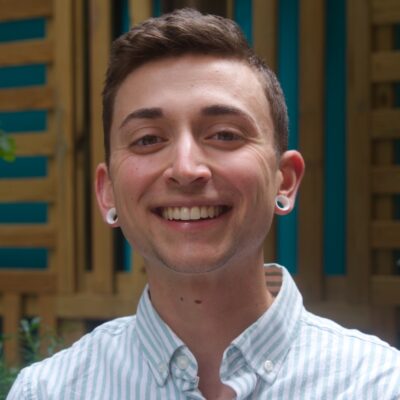Student Spotlight: Avery Sirwatka

December 11, 2023
Avery Sirwatka is a master’s student in public health from Jamestown, New York. He earned an associate’s degree from Jamestown Community College and a dual bachelor’s degree in public policy and psychology from the University at Buffalo and now studies the impacts of laws and policies on the built and natural environment under the guidance of Elizabeth Fox at Cornell.
What is your area of research and why is it important?
My research and work broadly seek to understand the impacts of laws and policies on the built and natural environment and, in turn, how the inequitable distribution of systems and resources may affect health outcomes. As a student who has worked primarily around the food systems space, I’m particularly interested in understanding the legal and political decision-making processes that shape communities’ access to resources necessary for most municipal- and household-level functions, such as land and water, including why, where, and who have such resources available.
What are the larger implications of this research?
As the global climate continues to change, communities will increasingly face resource shortages, particularly given the continued rise of populations, built environment development, and resource extraction. Yet, we know that a lack of resources, such as land and water, is not expected to occur evenly. Oftentimes, the most vulnerable of communities are the ones that will be the most impacted, compounding existing risk. In other instances, however, other communities that may lack pre-existing vulnerability may face resource shortages, which may force communities to relocate, potentially placing burdens on other infrastructural and natural resource systems. My research aims to look at how to prevent population-level health impacts of these shortages as the climate and global population continue to shift.
What does it mean to you to have been selected for a CDC Public Health Law Fellowship?
The Centers for Disease Control and Prevention Public Health Law Fellowship was a wonderful opportunity to apply the skills I have gained thus far in my graduate education in a real-world setting alongside a brilliant group of scholars, composed of M.P.H. and J.D. students. Public health works primarily at an upstream level to modify structural and social determinants of health, and there’s arguably no broader impact that can be made than modifying laws and policies. Discriminatory laws serve as the historical basis for many modern health inequities, and it was an absolute delight to be able to be a part of a group of individuals tasked with dismantling these injustices.
What will this fellowship allow you to do that you may not have been able to otherwise?
Oftentimes, we think of individuals trained in the field of law as only practicing in the courtroom. The fellowship provided me the opportunity to engage with individuals working at the intersection of law and public health in settings such as local health departments, federal institutions, and academic institutions, which opened my eyes to how critical the growing field of public health law is in working towards more equitable health outcomes. I particularly appreciated the fellowship’s emphasis on building a community of practice amongst the participating fellows to be at the forefront of such important work.
President Pollack has designated this academic year’s theme as freedom of expression. What does freedom of expression mean to you?
To me, freedom of expression means the ability to speak, think, act, and express oneself without fear of retaliation. This doesn’t mean that there’s a lack of dialogue or disagreement. Particularly in such partisan environments, I think that we sometimes tend to over-correct and believe that everyone must come to a consensus, but that’s not necessarily true. Freedom of expression challenges us to be able to hold multiple thoughts or feelings at once, oftentimes when they’re very much opposed to our own, and continue to be able to respect and value that other individual.
What are your hobbies or interests outside of your research or scholarship?
Outside of my research, I enjoy reading, hiking, camping, and spending time with my wonderful partner and our cat and dog.
Why did you choose Cornell to pursue your degree?
Public health is an inherently interdisciplinary field. I chose to pursue my degree at Cornell to leverage the expertise across departments with experts at the forefront of their fields. Diversity of thought is critical to public health, particularly as the field continues to grapple with many wicked problems that don’t seem to budge. The public health workforce will be able to practice more efficiently and effectively through integrating theories, methodologies, and practices from other fields. Cornell is a place that allows me to leverage multiple disciplines as I work toward building more equitable and resilient communities.
